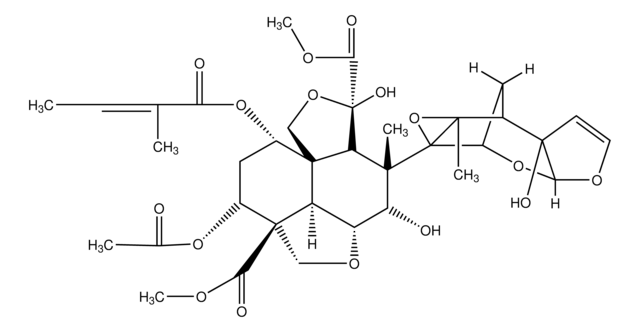34509
Monuron-(dimethyl-d6)
PESTANAL®, analytical standard
Synonym(s):
N′-(4-Chlorophenyl)-N,N-di(methyl-d3)urea
About This Item
Recommended Products
grade
analytical standard
Quality Level
product line
PESTANAL®
shelf life
limited shelf life, expiry date on the label
application(s)
agriculture
environmental
format
neat
SMILES string
ClC1=CC=C(NC(N(C([2H])([2H])[2H])C([2H])([2H])[2H])=O)C=C1
InChI
1S/C9H11ClN2O/c1-12(2)9(13)11-8-5-3-7(10)4-6-8/h3-6H,1-2H3,(H,11,13)/i1D3,2D3
InChI key
BMLIZLVNXIYGCK-WFGJKAKNSA-N
Legal Information
Not finding the right product?
Try our Product Selector Tool.
Signal Word
Warning
Hazard Statements
Precautionary Statements
Hazard Classifications
Acute Tox. 4 Oral - Aquatic Acute 1 - Aquatic Chronic 1 - Carc. 2
Storage Class Code
11 - Combustible Solids
WGK
WGK 3
Regulatory Listings
Regulatory Listings are mainly provided for chemical products. Only limited information can be provided here for non-chemical products. No entry means none of the components are listed. It is the user’s obligation to ensure the safe and legal use of the product.
ISHL Indicated Name
Substances Subject to be Indicated Names
ISHL Notified Names
Substances Subject to be Notified Names
JAN Code
34509-BULK:
34509-VAR:
34509-10MG:
Choose from one of the most recent versions:
Certificates of Analysis (COA)
Don't see the Right Version?
If you require a particular version, you can look up a specific certificate by the Lot or Batch number.
Already Own This Product?
Find documentation for the products that you have recently purchased in the Document Library.
Our team of scientists has experience in all areas of research including Life Science, Material Science, Chemical Synthesis, Chromatography, Analytical and many others.
Contact Technical Service


